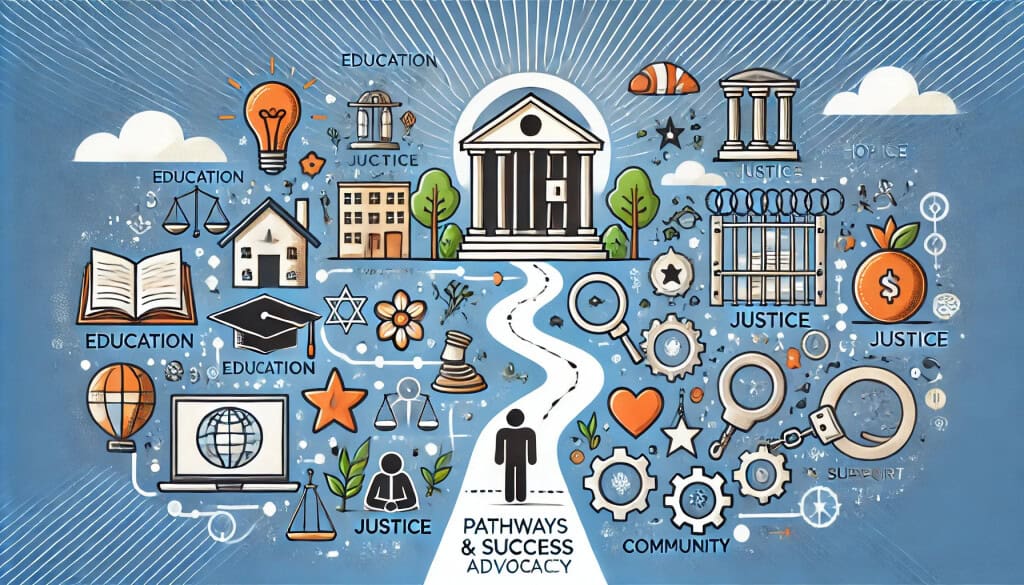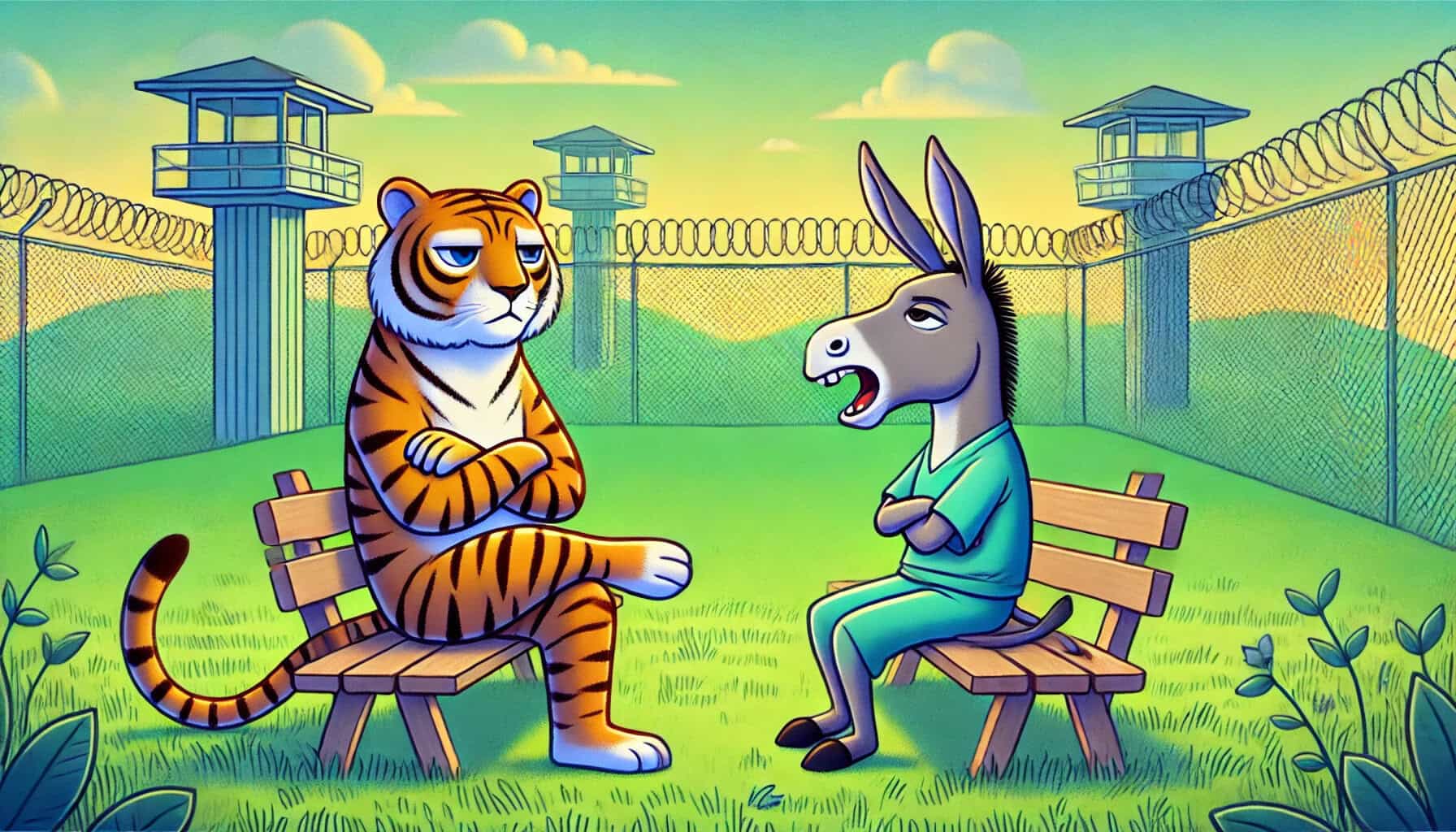Prison can be an environment filled with tensions, frustrations, and frequent arguments—often over minor issues, misinformation, or simple ego clashes. But there’s an essential life lesson we can all learn from an old fable about a donkey, a tiger, and a wise lion.
The Fable: Don’t Argue with Donkeys
One day, a donkey declared boldly to a tiger:
“The grass is blue.”
Confused, the tiger replied:
“No, the grass is green.”
The disagreement grew heated, and the two decided to seek judgment from the lion, the wise King of the Jungle.
Before even reaching the clearing where the lion sat, the donkey shouted loudly:
“Your Majesty! Isn’t it true the grass is blue?”
Observing carefully, the lion calmly responded:
“Yes, the grass is blue.”
Delighted, the donkey continued:
“The tiger disagrees, contradicts me, and annoys me. He must be punished!”
The lion solemnly declared:
“The tiger shall be punished with five years of silence.”
The donkey happily trotted away, repeating:
“The grass is blue! The grass is blue!”
Puzzled and accepting his punishment, the tiger asked the lion:
“Your Majesty, why punish me? We both know the grass is green.”
The lion sighed deeply and said:
“Indeed, the grass is green.”
Even more confused, the tiger asked:
“Then why am I being punished?”
The lion replied wisely:
“A wise and noble creature should never waste time arguing with a fool. Some are not interested in truth or reason—they simply want to win, regardless of the cost. By arguing, you diminish yourself.”
Applying the Lesson in Prison
In prison, every inmate faces countless daily interactions. Some of these can easily escalate into needless arguments or even physical violence. Ego, misinformation, rumors, and misunderstandings often ignite conflicts. But as the lion’s advice shows, sometimes the strongest decision is choosing not to engage.
Protecting Your Peace
Engaging in pointless arguments not only wastes your energy but also puts your personal peace and safety at risk. By recognizing when to stay silent or step away, you maintain control over your emotional state and protect your dignity. Remember:
• Not every argument deserves your attention.
• Being “right” is not always worth the conflict it brings.
• Avoiding unnecessary conflict is a strength, not a weakness.
Developing Inner Strength
Practicing self-control and choosing your battles wisely builds inner strength, emotional intelligence, and resilience—qualities crucial for success both inside prison and after release. This approach allows you to focus on what truly matters: personal growth, rehabilitation, and preparing for a successful reentry into society.
Practical Tips for Prisoners:
• Pause Before Reacting: If someone confronts you with misinformation or hostility, pause and ask yourself, “Is this worth my peace?”
• Redirect Your Energy: Instead of engaging in arguments, focus your energy on self-improvement activities like reading
Recommended Motivational Books:
1. Crucial Conversations: Tools for Talking When Stakes Are High by Kerry Patterson, Joseph Grenny, Ron McMillan, and Al Switzler
This book teaches readers how to navigate difficult discussions effectively, control emotional responses, and resolve conflicts peacefully.
2. The 48 Laws of Power by Robert Greene
Although controversial, this classic provides insights into understanding human psychology, managing ego-driven confrontations, and choosing battles wisely.
3. Emotional Intelligence 2.0 by Travis Bradberry and Jean Greaves
This guide focuses on self-awareness, managing emotions under stress, improving interpersonal relationships, and handling conflict productively.
4. Don’t Sweat the Small Stuff—and It’s All Small Stuff by Richard Carlson
A valuable resource on avoiding unnecessary stress, letting go of trivial arguments, and preserving emotional health.
5. How to Win Friends & Influence People by Dale Carnegie
This timeless book emphasizes empathy, understanding, and effective communication, highlighting the futility of confrontational arguments.
6. The Subtle Art of Not Giving a F*ck by Mark Manson
A straightforward look at choosing carefully what to invest emotional energy in, encouraging readers to focus on genuine personal growth rather than ego-driven conflicts.
7. Difficult Conversations: How to Discuss What Matters Most by Douglas Stone, Bruce Patton, and Sheila Heen
An excellent guide on managing emotionally charged conversations with tact, empathy, and a solution-oriented mindset.
8. Thinking, Fast and Slow by Daniel Kahneman
Understanding cognitive biases and emotional triggers helps readers become more aware of why arguments escalate and how to avoid them.
9. Ego Is the Enemy by Ryan Holiday
A powerful look at how unchecked ego can lead to pointless conflicts and missed opportunities for personal growth and harmony.
10. The Four Agreements by Don Miguel Ruiz
Simple but profound principles that can help readers avoid unnecessary arguments, maintain personal integrity, and live with inner peace.
About Pathways to Success and Georgia Prisoners Speak (GPS)

At Georgia Prisoners Speak (GPS), we believe that education is one of the most powerful tools for breaking cycles of incarceration and building a better future. That’s why we created the Pathways to Success program—a dedicated initiative providing educational resources, skill-building guides, and financial literacy tools tailored specifically for prisoners and their families.
GPS is a prison reform advocacy platform focused on exposing systemic injustices, pushing for policy change, and empowering incarcerated individuals with the knowledge they need to successfully re-enter society. Our educational articles are part of this mission, ensuring that those impacted by incarceration have access to practical guidance that can help them build stability, opportunity, and financial independence.
To explore more resources, visit Pathways to Success.

